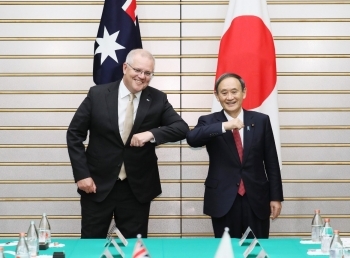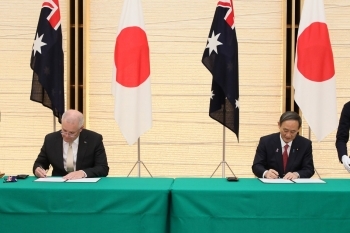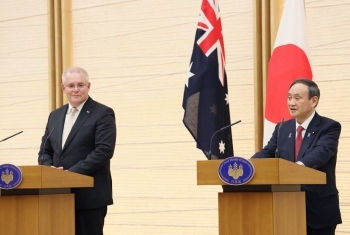Japan-Australia Relations
Japan-Australia Summit Meeting
November 17, 2020
 Japan-Australia Summit Meeting
Photo: Cabinet Public Relations Office
Japan-Australia Summit Meeting
Photo: Cabinet Public Relations Office
 Signing Ceremony
Photo: Cabinet Public Relations Office
Signing Ceremony
Photo: Cabinet Public Relations Office
 Joint press conference
Photo: Cabinet Public Relations Office
Joint press conference
Photo: Cabinet Public Relations Office
On Tuesday, November 17, Prime Minister SUGA Yoshihide and the Hon. Scott Morrison MP, Prime Minister of the Commonwealth of Australia, held summit meetings in Japan. Beginning shortly before 5:00 p.m., the leaders met one-on-one for approximately 20 minutes prior to their formal meeting, which lasted approximately 50 minutes. Later, Prime Minister Suga hosted a working dinner starting at 6:50 p.m. that lasted a little more than an hour.
At a joint press conference the same day, the leaders released a joint statement of their intent to further strengthen their cooperative relationship in fields including security and defence cooperation and the economy. [Joint statement(PDF) ]
]
The summary of the meetings is as follows.
At a joint press conference the same day, the leaders released a joint statement of their intent to further strengthen their cooperative relationship in fields including security and defence cooperation and the economy. [Joint statement(PDF)
 ]
]The summary of the meetings is as follows.
1 One-on-One Meeting
The leaders met one-on-one, with interpreters, for approximately 20 minutes, where, in a friendly atmosphere, they discussed their background, personal views and their approach to politics.
2 Main Meeting
The leaders discussed strengthening bilateral relations and cooperation on international issues.
In addition, the leaders instructed their respective Ministers for Foreign Affairs and Defence, with a view to elevating security and defence cooperation between Japan and Australia, to further strengthen bilateral cooperation in this area, through the Foreign and Defence Ministerial Consultations ("2+2") and other mechanisms.
The leaders also concurred to strengthen cooperation on economic security in areas such as telecommunications and critical minerals.
The two leaders concurred to promote cooperation in the economic field, including on hydrogen-related efforts.
General Remarks
The leaders affirmed that Japan and Australia, as "Special Strategic Partners" which share the basic values such as freedom, democracy, human rights and the rule of law and strategic interests, will together work toward realizing a "Free and Open Indo-Pacific."Security and Defence Cooperation, Economic Security
The leaders announced agreement in principle on the Japan-Australia Reciprocal Access Agreement (Japan-Australia RAA), which is being negotiated to take security and defence cooperation between Japan and Australia to a new level. The leaders concurred to accelerate the remaining tasks necessary for an early signing of the Japan-Australia RAA.In addition, the leaders instructed their respective Ministers for Foreign Affairs and Defence, with a view to elevating security and defence cooperation between Japan and Australia, to further strengthen bilateral cooperation in this area, through the Foreign and Defence Ministerial Consultations ("2+2") and other mechanisms.
The leaders also concurred to strengthen cooperation on economic security in areas such as telecommunications and critical minerals.
Economic Relations and Cooperation in International Fora
The leaders concurred to continue to work together on reforms at the World Trade Organization, including reforms to the Appellate Body, electronic-commerce rule-making, and the issues of "developing countries." They also welcomed the signing of the Regional Comprehensive Economic Partnership (RCEP) and, through close coordination between Japan and Australia, decided to play a leading role in realizing its early entry into force. The leaders also confirmed that they will continue to cooperate toward the steady implementation and expansion of the Trans-Pacific Partnership (TPP).The two leaders concurred to promote cooperation in the economic field, including on hydrogen-related efforts.
3 Working Dinner
The leaders exchanged views on the regional situation over dinner.
The leaders welcomed the United States' continued commitment to the Indo-Pacific region and stressed the importance of close cooperation with the United States to contribute to the peace and stability of the region.
On North Korea, the leaders concurred to work together on the full implementation of UN Security Council resolutions, including measures against ship-to-ship transfers. Prime Minister Morrison gave his continued full support for Japan's efforts on the abductions issue.
In addition, the leaders exchanged views on the South China Sea, East China Sea, Southeast Asia and other topics.
The leaders welcomed the United States' continued commitment to the Indo-Pacific region and stressed the importance of close cooperation with the United States to contribute to the peace and stability of the region.
On North Korea, the leaders concurred to work together on the full implementation of UN Security Council resolutions, including measures against ship-to-ship transfers. Prime Minister Morrison gave his continued full support for Japan's efforts on the abductions issue.
In addition, the leaders exchanged views on the South China Sea, East China Sea, Southeast Asia and other topics.

